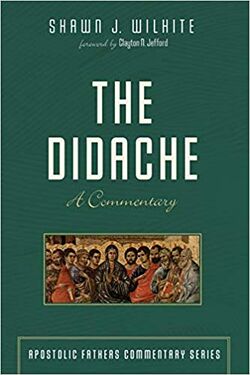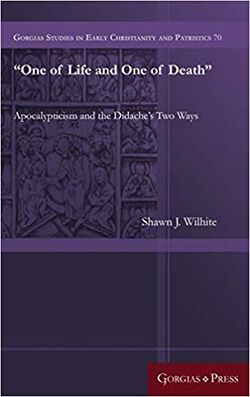Shawn J. Wilhite
(Redirected from The Didache: A Commentary (2019 Wilhite), book)
Jump to navigation
Jump to search
Shawn J. Wilhite
Shawn J. Wilhite (PhD cand., Durham University; PhD, Southern Seminary) is Assistant Professor of Christian Studies at California Baptist University. He directs and serves as a research fellow for the Center for Ancient Christian Studies, fellow for Andrew Fuller Center, and fellow for the Center for Baptist Renewal.
-- 2010s --
Shawn J. Wilhite, The Didache: A Commentary (Eugene, OR: Casade Books, 2019)
- Translation of the Didache, with a Foreword by Clayton N. Jefford.
- "The Apostolic Fathers Commentary Series aims to complement the study of early Christianity through historical, literary, and theological readings of the Apostolic Fathers. Writers of the AFCS volumes seek to be mindful of critical scholarship while commenting on a final-form text. Shawn J. Wilhite's commentary on the Didache includes a brief introduction to the Didache, the use of Scripture by the Didachist, and the theology of the Didache. The commentary proceeds section by section with a close ear to the text of the Didache, relevant early Christian literature, and current scholarship."--Publisher description.
- Series -- Apostolic Fathers Commentary Series.
- Contents -- Translation of the Didache -- Part I. Introductory Articles : -- 1. An introduction to the Didache -- 2. The reception of sacred scripture in the Didache -- 3. The theology of the Didache -- Part II. Commentary on the Didache : -- Didache 1.1-6.2 : Ethical instruction of the two-ways ethic -- Didache 6.3-10.7 : Liturgical rituals ; additional commentary [Coptic addition] ; Concerning the ointment (Didache 10.8) -- Didache 11.1-15.4 : Ecclesial and communal order -- Didache 16.1-8 : Eschatological ethics and teaching ; additional commentary : lost ending (Didache 16.9-12)
Shawn J. Wilhite, "One of Life and One of Death": Apocalypticism and the Didache's Two Ways (2019)
- "In this book, Wilhite assesses the apocalyptic influence upon the ancient Two Ways metaphor and, more specifically, how the Didache neglects to include a broadly standardized apocalyptic Two Ways genre. His argument will include essential critical evaluation of the apocalyptic genre and assess the apocalyptic features in ancient Two Ways texts, while the predominant focus of the book will document and critically assess how the Didache veers from maintaining an apocalyptic worldview in its expression of the Two Ways (Did. 1 6). This study portrays how ancient Two Ways texts comprise of a constellation of apocalyptic themes. In antiquity, the Two Ways often conveys the following five apocalyptic motifs: (1) angelic or otherworldly figures; (2) angelic or otherworldly ethical influence; (3) dualistic cosmological structures; (4) divine determinism; and (5) anthropological telic ends. Given this historical assessment of ancient Two Ways literature, Wilhite addresses the following question: if ancient Jewish and early Christian Two Ways texts have a common literary structure and reoccurring apocalyptic dualisms, how and why does the Didache neglect to frame the Two Ways with an apocalyptic worldview? With these prominent apocalyptic features in ancient Two Ways literature, the Didache\\x27s Two Ways (Did. 1 6) does not include the common apocalyptic features normally found in an ancient Two Ways genre and primarily maintains an ethical Two Ways orientation. The argument progresses in two stages that correspond to the topics of external texts and traditions, and literary readings of Did. 1 6. These two foci enable the argument to find historical correspondence with other literary traditions as well as identify a particular literary logic in the Didache itself."--Publisher description.

